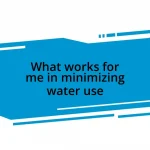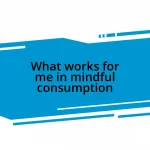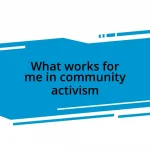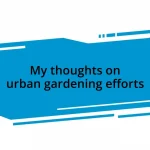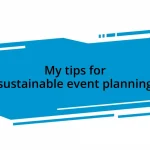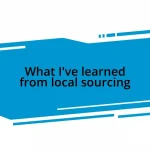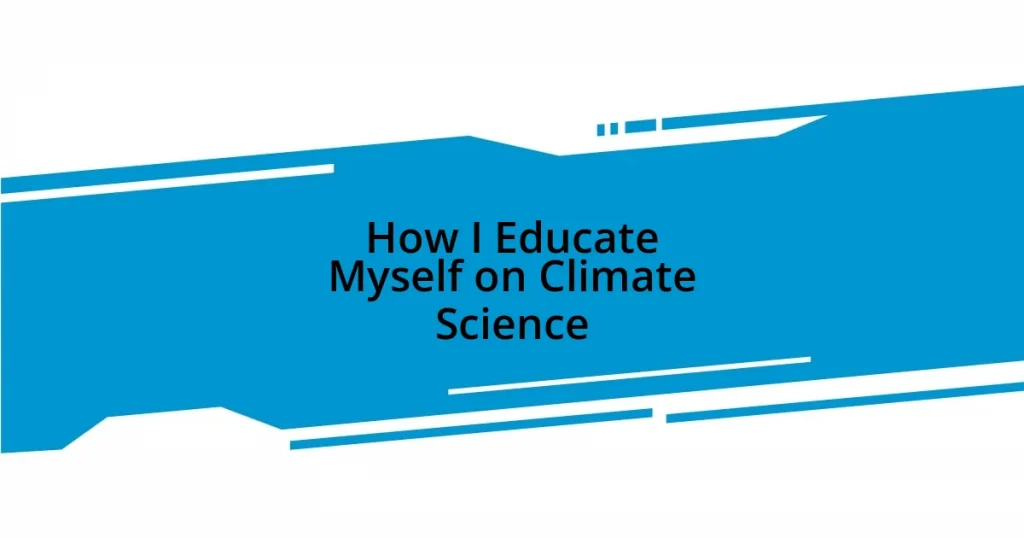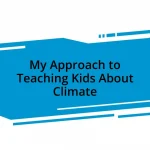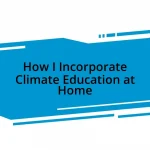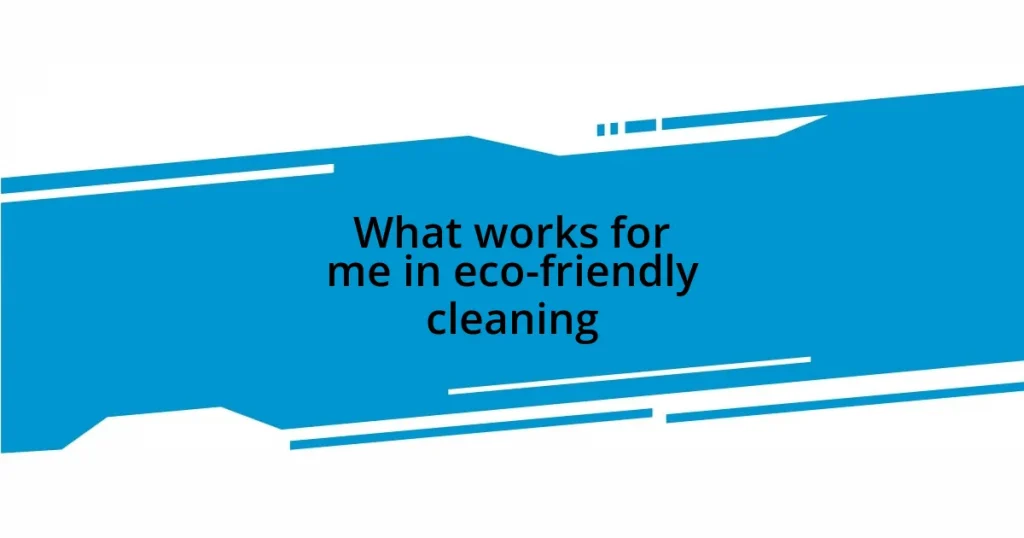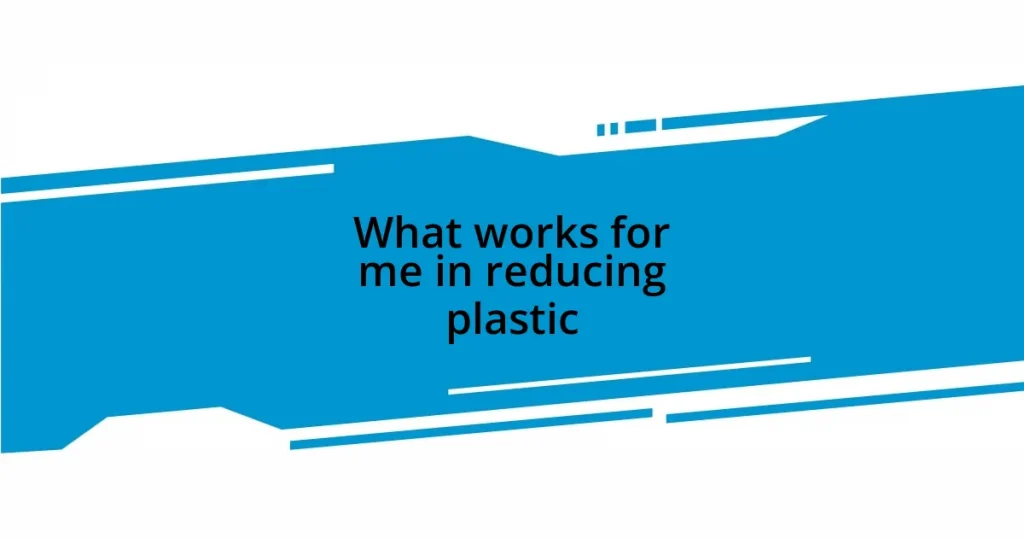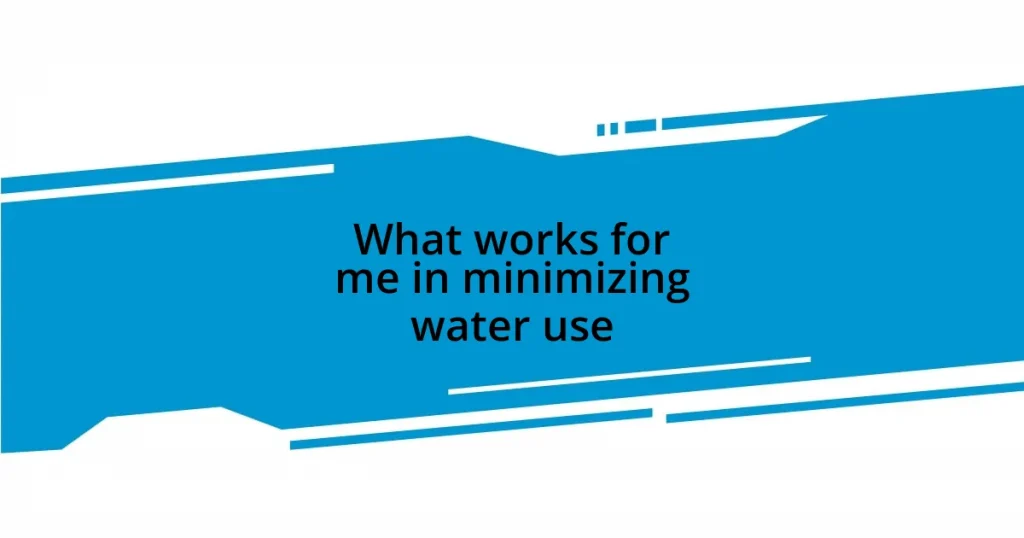Key takeaways:
- Understanding the greenhouse effect and carbon cycles are essential for grasping climate science and its real-world impacts.
- Identifying reliable climate resources, such as IPCC and NASA, is crucial for accurate information and informed discussions.
- Engaging with community efforts and participating in local climate events fosters empathy and action towards sustainability.
- Implementing sustainable practices at home, like composting and using energy-efficient products, enhances personal commitment to environmental stewardship.
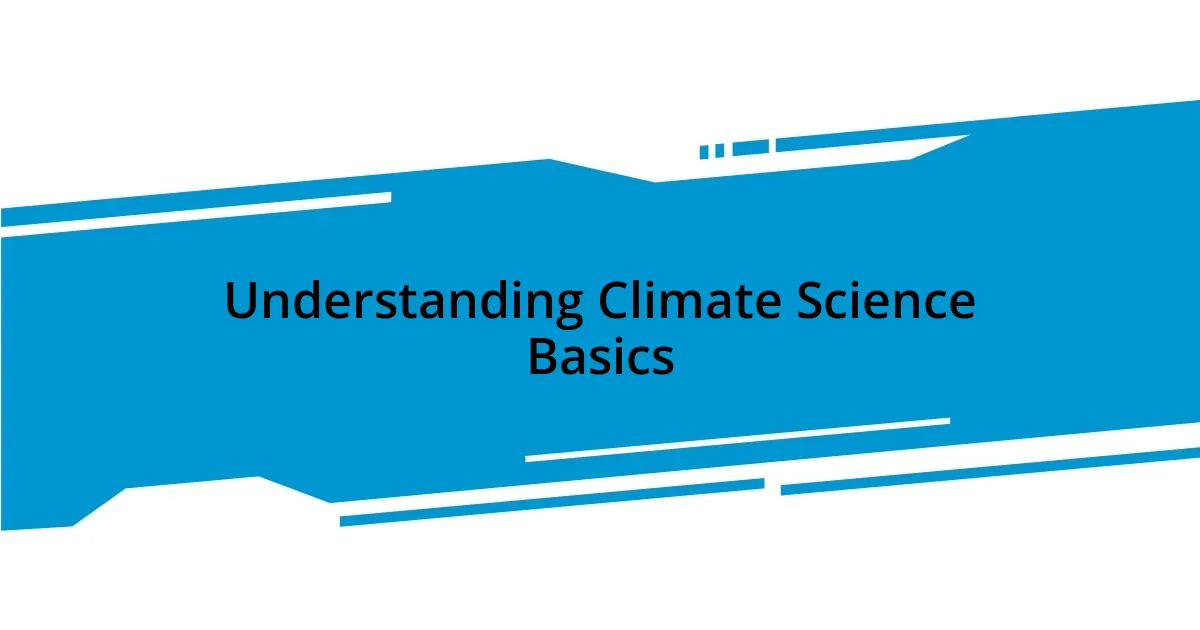
Understanding Climate Science Basics
When I first delved into climate science, I realized the importance of understanding key concepts like the greenhouse effect. It’s fascinating how greenhouse gases trap heat in our atmosphere, leading to global warming. Did you know that even a small increase in these gases can have significant impacts on our planet?
One day, while reading about carbon cycles, I discovered that the balance of carbon dioxide absorption and release is crucial for maintaining Earth’s climate. It struck me how human activities, like deforestation, disrupt this balance. Have you ever thought about how your daily choices can contribute to or help mitigate this disruption?
As I explored the impact of climate change on weather patterns, I felt a sense of urgency. Imagine unprecedented storms and rising sea levels changing landscapes you once knew. This isn’t just a theoretical concept—it’s a reality that can affect us all. Isn’t it vital for us to grasp these basics if we’re to make informed decisions for the future?
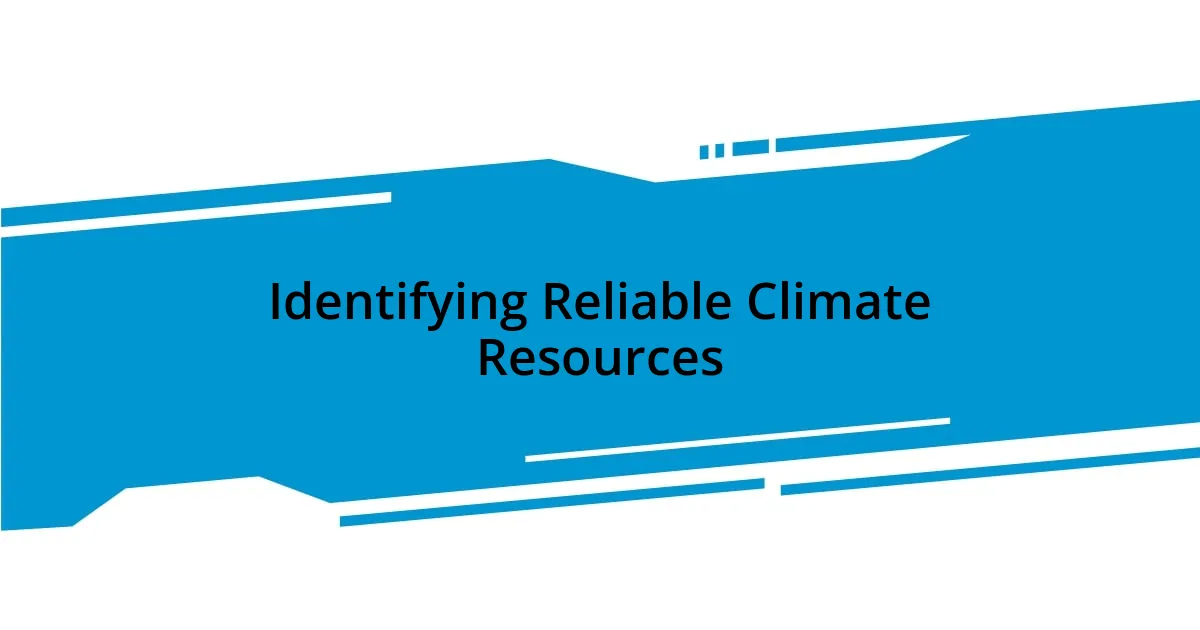
Identifying Reliable Climate Resources
Identifying reliable climate resources can sometimes feel daunting. I recall the time I stumbled upon a mix of reputable journals and sensationalist articles while searching online. I got caught in that web of misinformation, and it made me realize the importance of looking deeper. I learned to prioritize sources that are affiliated with scientific institutions or are peer-reviewed, as they tend to have stronger credibility. Have you ever thought about where the information you consume comes from?
In my journey to find trustworthy climate resources, I found that official organizations like the Intergovernmental Panel on Climate Change (IPCC) or NASA Climate provide well-researched data. I appreciate how these organizations present complex topics in an accessible way, often including interactive tools to visualize the data. It makes me feel more equipped to discuss climate issues when I can refer back to their findings. It’s comforting to know that I’m building my knowledge on a solid foundation.
Lastly, I’ve often turned to climate-focused documentaries and podcasts that feature experts in the field. Listening to scientists share their findings and passion has a unique way of making the information resonate on a personal level. It’s like having a conversation over coffee, where I’m not just learning facts but also feeling the weight of the urgency we face. I encourage you to seek out similar resources; it can change the way you perceive the climate crisis.
| Source | Type |
|---|---|
| IPCC | Reports |
| NASA Climate | Data and Models |
| Documentaries | Visual Education |
| Podcasts | Expert Discussions |
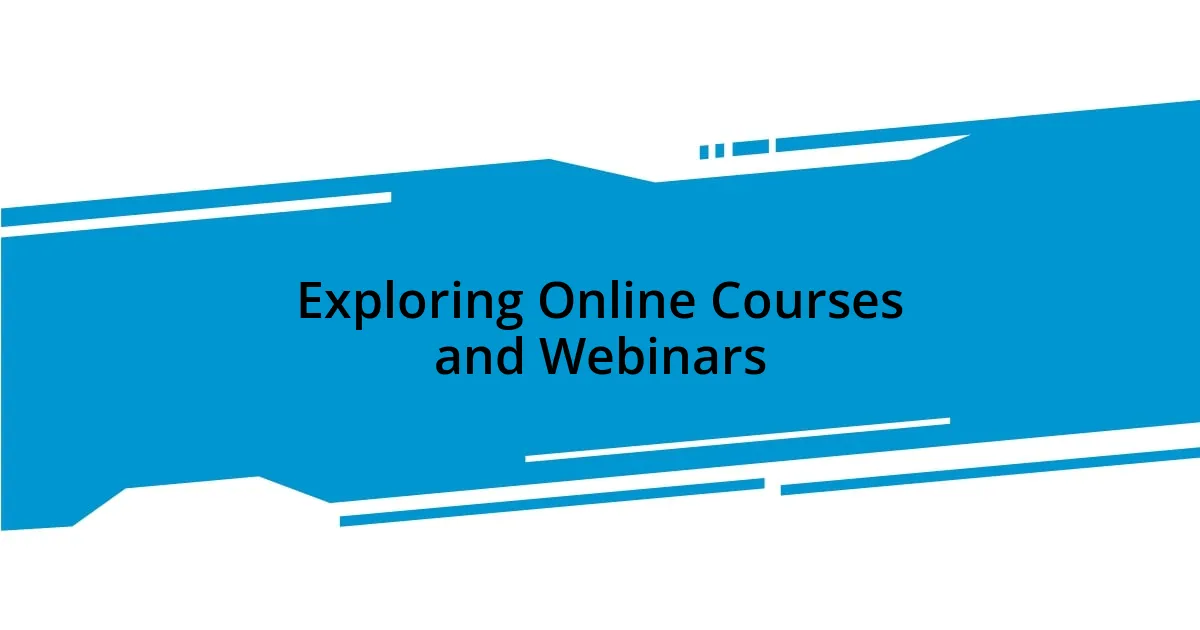
Exploring Online Courses and Webinars
Exploring the realm of online courses and webinars has been a game changer for me in understanding climate science. I vividly remember enrolling in my first MOOC (Massive Open Online Course) on climate change. The experience was immersive; it felt like sitting in a classroom with fellow learners from around the globe. I was not only absorbing information but also engaging with diverse perspectives that enriched my understanding. Have you ever felt that thrill of collective learning? It’s a unique environment that fosters curiosity and critical thinking.
As I navigated through various webinars hosted by leading experts, I discovered just how engaging and informative they can be. These sessions allow for real-time questions and discussions, making complex topics feel approachable. Here are a few notable platforms and resources I recommend for anyone keen on diving deeper:
- Coursera: Offers a variety of climate science courses from renowned universities.
- edX: Features interactive courses focusing on sustainability and climate change.
- FutureLearn: Provides free online courses tailored to equip learners with practical climate solutions.
- NASA’s Climate Change Webinars: Offers live discussions with climate scientists and detailed Q&A sessions.
- The University of Yale: Hosts webinars that tackle current climate policies and research trends.
Each of these avenues has broadened my perspective and reinforced the notion that continuous learning is essential in this ever-evolving field. I hope you find them as enlightening as I have!
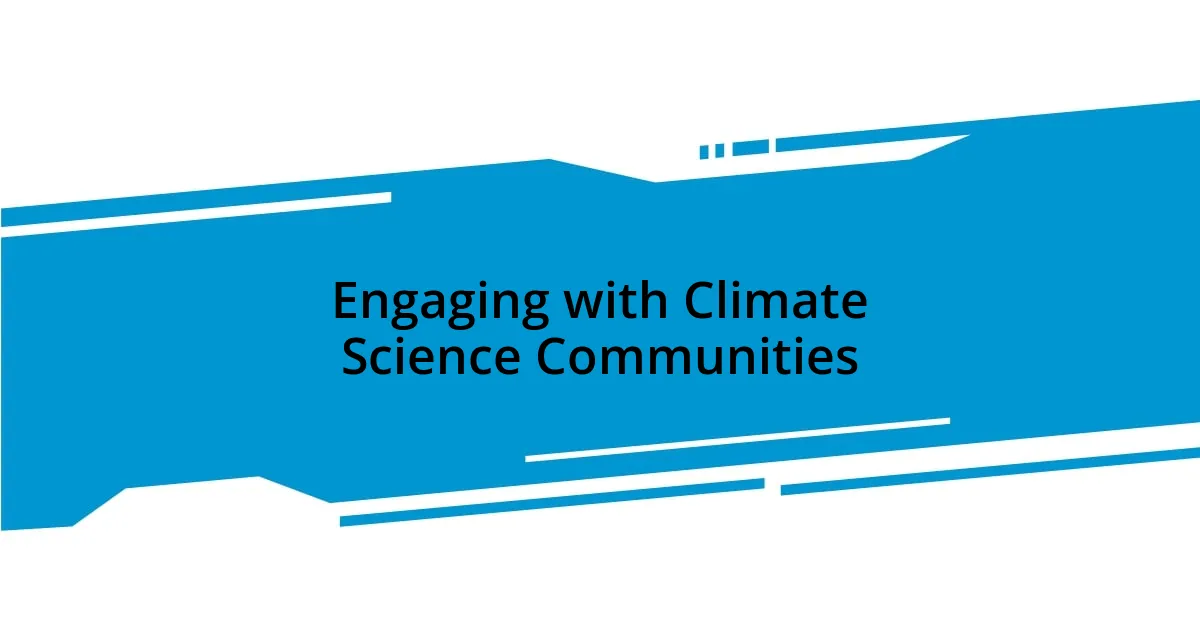
Engaging with Climate Science Communities
Engaging with climate science communities has truly transformed my understanding of the subject. I joined a local environmental group where members openly share their experiences and concerns about climate impacts in our area. Encountering real stories and emotions about how climate change affects lives has deepened my empathy and urgency to act—have you ever felt that surge of motivation from a community discussion?
Online forums also play a pivotal role in my climate education. I vividly remember when a heated conversation on a social media platform led to insights I hadn’t considered before. Each post and comment seemed to peel back a layer of complexity around climate policy, sparking questions that kept me up at night. Engaging with diverse opinions teaches me not just facts but also the rationale behind different viewpoints, and I find that balance incredibly valuable. What about you—do you have a space where your thoughts on climate science feel heard and challenged?
Additionally, participating in public seminars and workshops has been eye-opening. I recall attending one session led by passionate activists discussing local initiatives to combat climate change. Their enthusiasm was contagious; it ignited a fire in me to get involved. These experiences remind me that we’re all in this together, fighting for a common cause. How do you think community engagement influences our collective awareness and commitment to climate action?
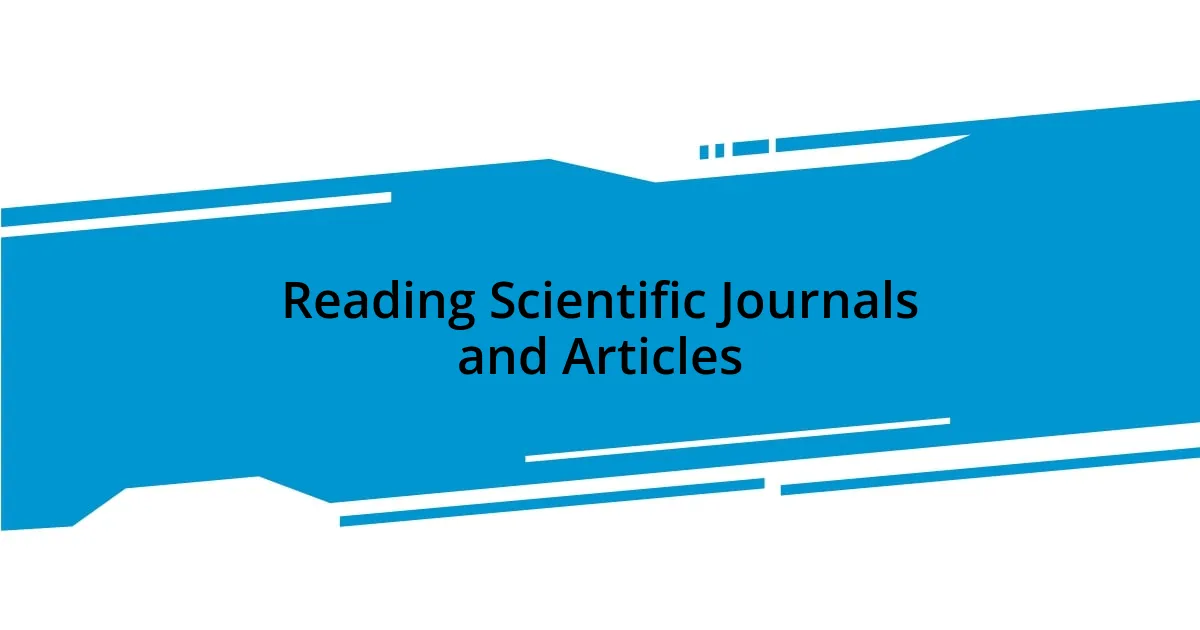
Reading Scientific Journals and Articles
Reading scientific journals and articles is a cornerstone of my self-education in climate science. I remember the first time I stumbled upon a research article by the Intergovernmental Panel on Climate Change (IPCC). At first, the technical language felt daunting, but with a bit of perseverance, I began to decode the jargon, and that feeling of understanding was exhilarating. Have you ever experienced that moment when complex information finally clicks? It’s incredibly rewarding.
Diving into scientific literature offers a rich tapestry of insights. I often find myself lost in the discussions around climate modeling and its implications for policy-making. One article that struck me was a study on the effects of ocean acidification. The detailed data made the consequences so palpable; it’s one thing to read about climate change and another to grasp its tangible impacts. This shift in perspective has spurred me to pay closer attention to how science informs real-world decisions. How often do we fully appreciate the connection between research findings and their significance for our planet’s future?
I try to keep a balance between digesting cutting-edge research and understanding foundational concepts. A helpful strategy has been to read summaries or review articles before delving into specialized studies. There was a time when I felt overwhelmed by the sheer volume of information. Now, I approach research with curiosity rather than trepidation. I often ask myself—what’s the main takeaway from this study, and how can it apply to my understanding of climate solutions? This question guides me, making each reading session purposeful.
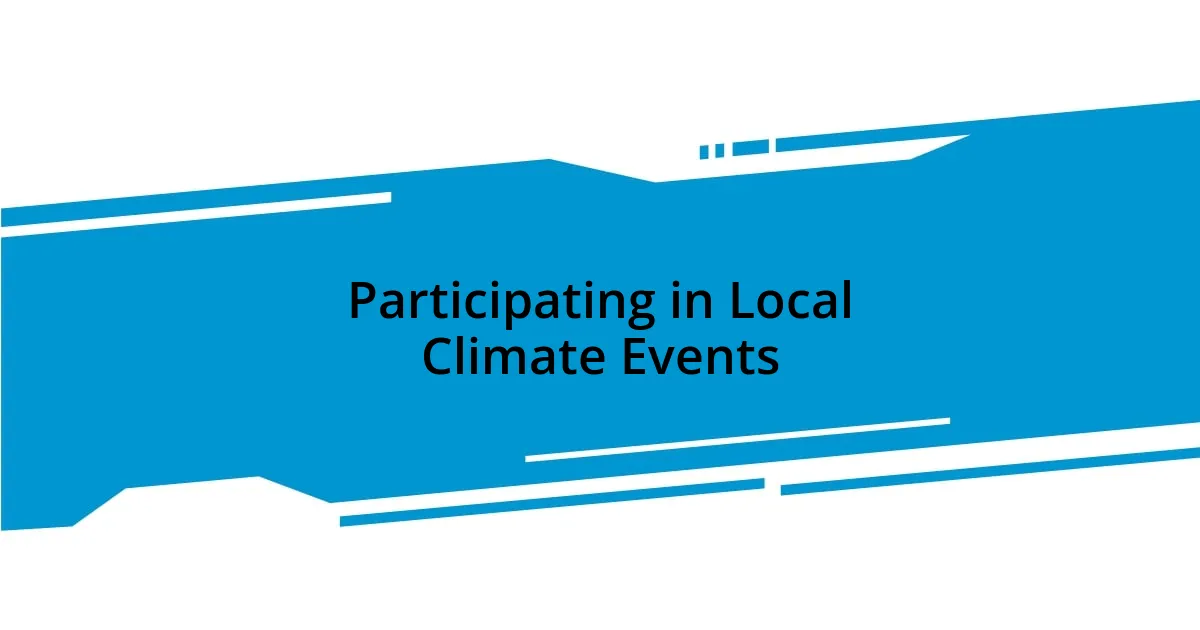
Participating in Local Climate Events
Participating in local climate events has become one of my favorite ways to deepen my understanding. I distinctly remember volunteering for a community clean-up day; being among passionate individuals made the experience feel less like a chore and more like a movement. There’s something incredibly rewarding about physically contributing to a cause, don’t you think? That tangible effort brings abstract concepts to life.
I also find that attending town hall meetings focused on climate initiatives can be enlightening. Listening to diverse perspectives on how our community plans to address environmental challenges exposes me to the nuances of local policy-making. I was particularly moved when a local farmer shared how changing weather patterns had disrupted their harvest. This kind of storytelling creates a connection that purely academic knowledge just can’t replicate. Have you ever felt the weight of someone’s personal testimony shift your understanding?
Moreover, participating in workshops where experts share practical skills, like gardening with native plants, has completely changed my approach to sustainability. I’ll never forget the satisfaction of planting my first native flower; it felt like I was giving back to the environment in a small yet meaningful way. These experiences illuminate the direct impact we can have on our local ecosystems. How can we not feel inspired to take action when we see the difference we can make ourselves?
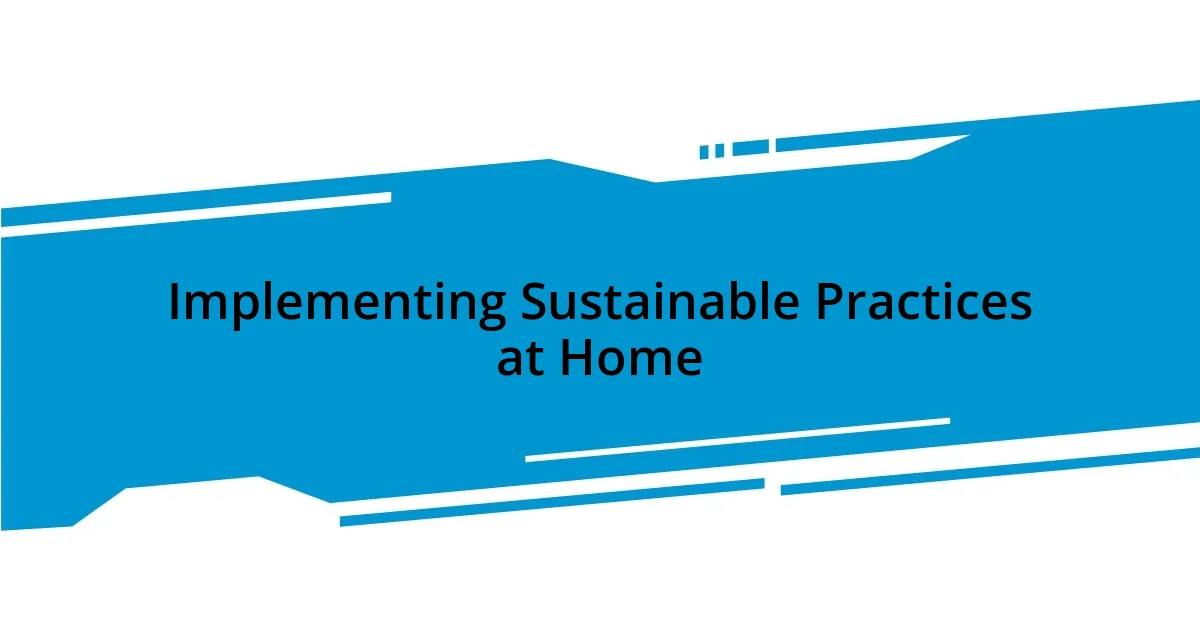
Implementing Sustainable Practices at Home
Implementing sustainable practices at home has transformed my daily routine in ways I never expected. I remember the moment I decided to finally switch to reusable shopping bags. Initially, it felt like an extra step in my busy life, but now, I can’t imagine grocery shopping any other way. Each time I see those bags, it’s a small reminder of my commitment to our planet. Isn’t it amazing how simple changes can become part of our identity?
Another impactful shift in my home is composting. When I first started, I was overwhelmed by the various “Do’s and Don’ts” of composting. But once I attended a workshop at my local garden center, everything clicked. Now, I feel a sense of pride whenever I add kitchen scraps to my bin, knowing they’ll eventually nurture the soil. The satisfaction of turning waste into something beneficial for my plants feels remarkably empowering. Can you relate to that sense of fulfillment from making a positive change in your environment?
Lastly, I’ve incorporated energy-efficient habits that have not only reduced my carbon footprint but also lowered my utility bills. I never thought much about switching to LED bulbs—until I did it and immediately noticed the difference. The warm glow they emit is comforting, and knowing they last longer and consume less energy gives me peace of mind. Have you considered how small adjustments like this can lead to significant benefits? Embracing these changes hasn’t just made my home more sustainable; it has deepened my connection to the world around me.



